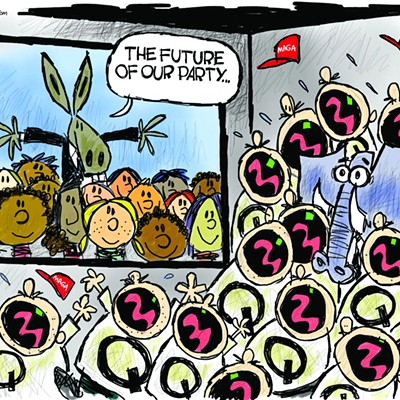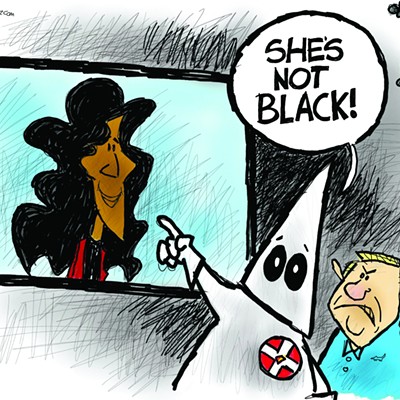Here's a look at the three primary races:
Attorney General Republican Primary
Experience is the main focus of the two leading contenders in this race. But, reminiscent of four years ago when a bitter Republican primary helped Janet Napolitano to victory, as election day nears charges and counter-charges are flying.
John Greene is a 54-year-old partner in a Phoenix law firm and represents health care, insurance, retail and agricultural clients. He formerly served in the Arizona Senate and was once the director of the Arizona Department of Insurance. Greene points to this political background and his accomplishments while in office as one advantage he could bring to the job of Attorney General.
Foster Robberson, 49, is a partner in the Phoenix branch of the Lewis and Roca law firm and this is his first election race other than as a precinct committeeman. If successful, he promises to "keep politics out of the office of attorney general" and points proudly to his highest ranking by the Martindale Hubbell national lawyer rating service.
Both candidates support doing more to crack down on consumer fraud while increasing the service delivery of the office without expanding its staff. They also promise to look into the state's possibly illegal collection of Social Security numbers on numerous application forms.
But the two differ on their views toward mandatory sentencing. Greene believes they are needed for those who commit egregious crimes, but says, "Our [criminal justice] system is flooded with drug users who are not dangerous to society. We should incarcerate people to protect the community and to punish criminals, but we need more rehabilitation services for drug users. If they commit other crimes, however, they should be jailed."
Robberson says he's not opposed to tinkering with mandatory sentences, but adds, "There is value in uniformity. The notion should be to continue mandatory sentencing and strong [legal] guidelines to prevent disparate sentencing."
But it is Robberson's assertion that Greene would introduce political considerations into his decision-making as attorney general which divides the two candidates most. While refusing to name which Republican he was referring to, Robberson compared one of his primary opponents to past office holders. "I think we have been under-served by people who use the attorney general's office as a political stepping stone," he said. "They make decisions with one eye on the polls." Then he added of his unnamed, but obvious, opponent, "They would be a hands-off attorney general, and make decisions based on a political agenda."
Robert Stryk, Greene's campaign manager, vehemently denies the charge. "It's politics as usual," he says. "John Greene is more interested in talking about real issues that affect real people."
The third candidate in the race is Andrew Thomas, a long-shot who didn't return the Weekly's phone calls. He is running under the "Clean Elections" program but Robberson and Greene are not. While neither would reveal their primary campaign budgets, indications are both will spend hundreds of thousands of dollars on the race in order to face-off against Democrat Terry Goddard and Libertarian Ed Kahn in the November general election.
Secretary Of State Republican Primary
Differing ideas over voting methods separate the three candidates. While each supports having all Arizona counties use optically scanned ballots to cut down on inaccurate election counts, how that should be accomplished divides them.
Current deputy director of Governor Jane Hull's Tucson office, Sharon Collins proposes that Arizona become the second state in the nation after Oregon to use an exclusive "vote by mail" procedure. This system would save a considerable amount of money, which Collins wants invested in optical scanning equipment for the 10 counties that now don't have it.
Under her proposal, ballots would be mailed out to every registered voter two weeks before a state election. When they are returned, the voter's signature would be scanned and every ballot looked at to prevent fraud. On election day, security boxes would be located in key spots at which ballots could be deposited, but the traditional polling places and election workers would become extinct for these races.
Both Sal DiCiccio and Jan Brewer oppose this idea. DiCiccio believes that the two-tiered voting system we now have, with vote-at-home ballots and election day polling places, works well. To pay for optical scanning equipment, he suggests instead pursuing some combination of federal grants, county funds and private donations.
Brewer also is against the exclusive "vote by mail" proposal, arguing that Election Day is an institution that should be maintained and believing voter fraud could be a problem. Admitting it will be difficult for the state government to come up with the estimated $3 million needed for the optical scanning system, she also favors pursuing federal grants or private donations.
Brewer, who served in the legislature for 14 years and on the Maricopa County Board of Supervisors for 5, thinks voting by armed service personnel needs to be made easier. "Improving military voting is real important," she says, and has proposed allowing signed ballots with verified signatures to be faxed in to prevent slow international mail delivery problems.
Former Phoenix City Councilman DiCiccio lists several initiatives he would like to pursue if elected, including the requirement of financial revelations by legislative lobbyists. "We need full and complete disclosure," he says. "There are 1,400 bills introduced each session with no information on what is spent to get them through. What is important is how much is being spent by both private and public lobbyists."
With the recent Arizona tradition of having the secretary of state elevated to the governor's office, all three candidates say they are ready. Brewer points to her political background, Collins to her administrative experience and DiCiccio to the wide ranging platform he has spelled out for voters.
All three are running under the "Clean Elections" program, which Tucsonan Collins believes levels the playing field in her attempt to beat two Maricopa County opponents. The primary winner will be opposed by Democrat Chris Cummiskey and Libertarian Sean Nottingham in November.
Superintendent Of Public Instruction Republican Primary
The views of the three candidates vary as much as the grades they give education in Arizona. Keith Bee says teachers deserve an "A" but the state a "C," Tom Horne's mark is an overall "B" with an "F" for funding but "A-" for performance, and Jaime Molera hands out a "B-." While all three bemoan cuts to university budgets and would push for more discipline in the classroom, their differences are distinctive.
Former southern Arizona legislator Bee got involved in the race, he says, "because I was tired of the debate over whether [our educational system] is 48th, 49th or 50th in the nation. We should be in the top 10!" To attract more teachers, he believes in better compensation along with recognizing teaching certificates from other states.
Stressing the need for more vocational education programs, Bee says, "the business community must step up. They say students are not trained well, but they should support classroom efforts by donating materials, like newer cars for shop classes."
Attorney Horne, a 24-year veteran of the Paradise Valley school board, stresses the changes he would make if elected. Using the bully pulpit of the office, he could back teachers in disciplinary matters. "If teachers know they are supported, they're not afraid. In districts where they're not supported [by the board], they give up."
Based on his experience with the Paradise Valley system, which he carefully points out does not include the wealthiest parts of that community, Horne believes the state should limit school district administrative costs to 5 percent of the total budget. "There is incredible waste in administration," he says, money that could be better spent in the classroom.
While agreeing with Horne's goal of increased classroom funding, appointed incumbent Molera calls the 5 percent cap a "silly" idea that is a "magic bullet" funding solution. Instead, he says he has worked with those pushing the Indian gaming 202 initiative to secure a significant portion of funds for K-12 education.
To offer more vocational education programs for high school students, Molera thinks several school districts should combine their resources. The East Valley Institute of Technology successfully does that now, he says, using a special voter-approved property tax levy.
Molera and Horne disagree about the AIMS test. The latter wants to see it modified to more closely reflect the education students actually receive, while Molera is pushing for an AIMS ED equivalent demonstration program. This, he says, would allow students to show in a reliable way that they have mastered certain skills. Horne opposes the idea, calling it simply a "class project," a designation Molera strongly protests.
The two also take separate views on English immersion programs. Horne has written, "If elected, I will reverse the current policy of not enforcing that initiative." For his part, Molera says of these and other charges from his opponent, "Horne throws out blatantly false accusations."
Both Bee and Molera are running under the "Clean Elections" program that will limit their campaigns to $130,000. Horne, however, plans to spend at least $300,000 of mostly his own money, saying, "There is no way to run against an incumbent under 'Clean Elections.'" Despite the financial difference, Molera concludes, "I kind of like my chances."
Superintendent Of Public Instruction Democrat Primary
Mesa Junior High School Principal Rod Rich is squaring off against ASU professor Jay Blanchard in this contest. The winner, along with Libertarian John Zajac, will compete against the Republican nominee.
Rich believes Arizona deserves an "A" for its educational effort, but for results gives affluent districts an "A" while poor ones receive a "D" or "F." To change that, he says the state needs to find a more predictable revenue stream than the general fund, and suggests looking at the tax credit system to begin with. "We've lost $109 million for education over four years," he says of the current tax credit structure, "an amount which will continue to grow."
To encourage more people to become teachers, Rich believes, "We need to pay people better and restore pride in the profession. [Society] has lost respect and trust in teachers because of assaults by politicians." That, he believes, needs to change.
The candidate thinks it is a mistake to use AIMS as a high risk test. But he supports keeping it as a guide if teachers receive additional support to instruct their students to the educational level of AIMS.
While not responding to The Weekly's phone calls, Blanchard has spelled out his platform for other media. It includes doing away with the AIMS test, increasing teacher pay and insuring that charter and traditional public schools compete on a level playing field. Of the education system in Arizona in general he has written, "we continue to slip toward becoming the Mississippi of the desert."












